

|
A r t i c l e s A n d C a s e
S t u d i e s
The Importance of Natural Equine
Nutrition
In this article: Learn what the foremost Barefoot and Natural Horse Care experts say about - Nutrition in the Natural Environment; Medicinal Use of Plants; How Good is Your Soil? Controlling Disease through Mineral Balance; Mineral Supplementation Naturally; plus Natural Supplement Resources and Further Information.
By Teresa Maxwell
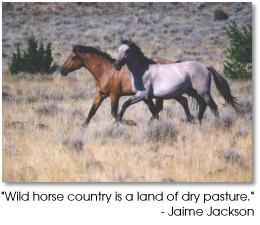
Barefoot hoofcare is more than just how to correctly trim
hooves. It is a method of equine management which looks after
the whole horse, which is why you get such incredible results in
the horse's general health when you apply the barefoot method. Providing natural boarding conditions and natural nutrition is an
important part of Barefoot hoofcare.
Often, when the horse is returned to it's natural environment after being boarded conventionally, and shoes, rugs and covers are removed, the true state of the horse's health is evident, and sometimes, it's not so pretty!
This often indicates a previous lack of natural care, and may result in problems like rain scald, mud fever, and general illness as well as any hoof problems.
Using natural supportive therapies and remedies when your horse is not well, in transition to barefoot, or to maintain good health, is important for the whole horse. In this article, we explore what your horse requires to be in top condition, From a barefoot point of view, naturally.
Nutritional Value in the Natural Environment
Dr Strasser in her book A Lifetime Of Soundness says it's important for the horse to be able to feed continuously - 24 hour a day availability of branches, pasture and hay is ideal.
"Pasture access is extremely important; it is to a horse what access to water is to a seal: its natural habitat. It also allows the horse a good start to the nutritional variety it needs," Dr Strasser says.
"Concern about poisonous plants is usually not warranted, since horses living naturally with access to vegetation and hay 24 hours a day, year 'round, will not poison themselves on a toxic weed (whereas a horse that is very hungry, or one kept in a box stall, will often eat virtually anything green it can get its teeth on.)"
Dr Strasser says to allow the horse as much nutritional variety as possible, from which it can decide what it needs. You may do this by varying the source of hay over the course of the year (from different fields etc as each field has different soil conditions and will therefore produce slightly different hay), and allowing the horse to graze during breaks when riding out.
Jaime Jackson in his book Horse Owners Guide To Natural Hoof Care advocates dry pasture for horses, as this is the mustang's natural feed in the wild.
"Green pastures are founder traps, so if you've got your horse out in lush pasture, get him out of there as quick as you can. Wild horse country is a land of dry pasture."
Jackson advocates feeding more than one kind of hay, recommending timothy, orchard, brome and most other non-leguminous grasses, which seem to be compatible with the horse's digestive peculiarities while fulfilling his nutritional needs.
"Avoid all legumes, particularly Alfalfa, clovers and vetches, and do not feed any member of the fescue family of grasses. All of these seem to be dangerous founder traps," he says.
In his book Founder: Prevention and Cure the Natural Way, Jackson advocates feeding your horse a range of mineral and vitamin rich plants.
"Wild horse country has a great variety (albeit scattered widely) of delectable and nutritious fruits, nuts, flowers, stems, bark and so forth. Your horse will think he's died and gone to heaven when you make haste from the supermarket or your garden with a range of fruits and vegetables. Experiment. Bring home some broccoli, lettuces, squash, whatever. Let him tell you what he likes. He's not stupid and will "kick out" what he doesn't want or need with his prehensile lips."
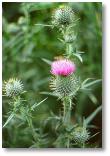
Medicinal Use of Plants
Ever see your horse eat thistles? Wonder why your horse will pick out certain plants and not others?
Dr Strasser says in A Lifetime Of Soundness that horses generally know best what is good and bad for them, and will abide by this instinct as long as they are given a choice.
Watching what your horse eats and consulting a handbook on healing herbs will help you identify possible health problems of your horse, often before clinical symptoms become visible, as the horse will start to "medicate" itself before symptoms are visible to humans.
For example, eating thistles is a sign that the horse's liver function is disrupted (most commonly as a result of hoof problems caused by shoeing or improper trimming).
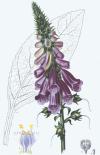
"Also, some horses will eat digitalis, a plant that is extremely poisonous and is used to produce heart drugs. This is an indication of heart problems, which can often be a result of chronic lack of movement (the heart is overstressed because it is not supported by the pumping actions of muscles, joints and hooves)," Dr Strasser says.
"In summer, horses will eat oak leaves to prevent diarrhea from all the falling apples. Plantain contains antihistamines, and is effective against the itch of insect bites. And so on."
How Good is Your Soil?
Often, if the grass or feed you're giving your horse is grown on soil that is deficient in some minerals/vitamins or badly out of balance minerally, it can lead to illness in the animal that eats it.
Pat Coleby in her book Natural Horse Care says that "chemical farming" causes deficiencies, caused generally by the acidifying and/or inhibiting action of artificial manures and fertilisers.
"Tests were done mid-century over a period of 15 years in the UK at the Haughley Experimental Centre by a soil scientist named Schuphan. He established that 28 percent of minerals and vitamins were missing from the finished products of chemical farming. In organic farming, all these essentials were available to the user of the crop, be it grass, cereal or roots," Coleby says.
Other minerals, such as sulphur, boron, copper, cobalt, zinc and selenium may also be deficient, either inherently or where modern chemical farming methods have been practised, she says.
Coleby recommends that the soil be analysed and any deficiencies be addressed using natural minerals, such as dolomite lime for calcium and magnesium balance. However, it is possible to assess the health of the pasture before it is analysed, she says.
"A preponderance of bracken, fireweed, dock, cape weed, buttercup, onion grass, oxalis, hoary cress, heliotrope - any or all of these - means that the soil is starved of humus (organic matter), the calcium to magnesium ratio is way out, and/or the sulphur and pH the same.
"The analysis will show up the lime mineral imbalances and the paddock may need calcium and/or magnesium and/or gypsum, otherwise it will not become healthy."
Controlling Disease through Mineral Balance
"Many so-called infectious diseases appear to be quite easily controlled by balancing the minerals in the horse's diet. When the animal is correctly supplemented, these infections just do not occur, even when there are predisposing factors," Pat Coleby says.
Conditions caused by a lack of calcium and/or magnesium include arthritis, founder, mastitis/tetanies, and nervous/spooky behaviour.
Conditions caused by a lack of copper include all fungal diseases, anaemia, fence and bark chewing, herpes infections, impaired immune system, rain scald, ringworm, seedy toe, wind sucking, worms and coccidia.
Conditions caused by a lack of sulphur include external parasites and an inability to assimilate selenium.
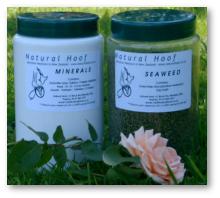
Mineral Supplementation Naturally
As there are few places in the world that can lay claim to a perfectly balanced soil, supplementation is necessary to keep our horses healthy, whatever their job, Coleby says.
She recommends a diet of equal parts lucerne and oaten chaff and bran, with half a part of either barley or oats. The feed should not exceed a two-litre measure for a horse in heavy work, 1 litre for a horse in light work.
The natural minerals Dolomite Lime, Sulphur and Copper Sulphate, plus Apple Cider Vinegar and any other necessary natural minerals and vitamins can be added to the feed.
Coleby says that Seaweed also marketed as kelp has an amazing amount of trace minerals, all in organic form and in balance, thus ensuring that no toxicity can occur. She recommends seaweed be fed to all horses free choice, so that they may take as much or as little as they need. If seaweed is overfed, ie; we put too much in their feed, some horses can become ill or unmanageable, which won't happen if it is fed ad lib.
It is important that the minerals you add to your horse's diet are natural minerals. "Animals on highly chelated minerals do not do well and professionals with whom I have discussed this have ventured the opinion that chelated minerals are not safe," Coleby says.
Jackson in Founder: Prevention and Cure The Natural Way advises against such vitamin mixes as they are concentrates and do not occur naturally in the wild.
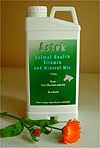
Natural Supplement Resources and Further Information
Natural Hoof has a selection of natural minerals available, including the
Natural Hoof Minerals, a mixture of Dolomite Lime, Sulphur and Copper Sulphate,
and a natural Mineral and Vitamin Supplement: Astek Mineral Mix, as well as
seaweed. See our Minerals category for more information.
For further information, we recommend anyone interested in or already involved in Natural Hoofcare and Equine Management read the following books:
or contact Teresa for further information on: 07 868 3881 or email: teresa@naturalhoof.co.nz.
Submit an Article or Case Study
The more we share information, the better off our
horses are going to be. If you'd like to share your
story, please email the
editor.
Disclaimer: Natural Hoof
reserves the right to change or edit any part of
all articles and case studies submitted to this
website. Natural Hoof does not take any
responsibility for the content of any articles
and/or case studies and/or any misapplication of the information presented in any articles. Natural Hoof presumes readers consult a professional for more information about any topic covered in any Natural Hoof article.
Home | Articles | Study Groups | Clinics-Events | Brag | Classifieds |
Order | Links


|
|









